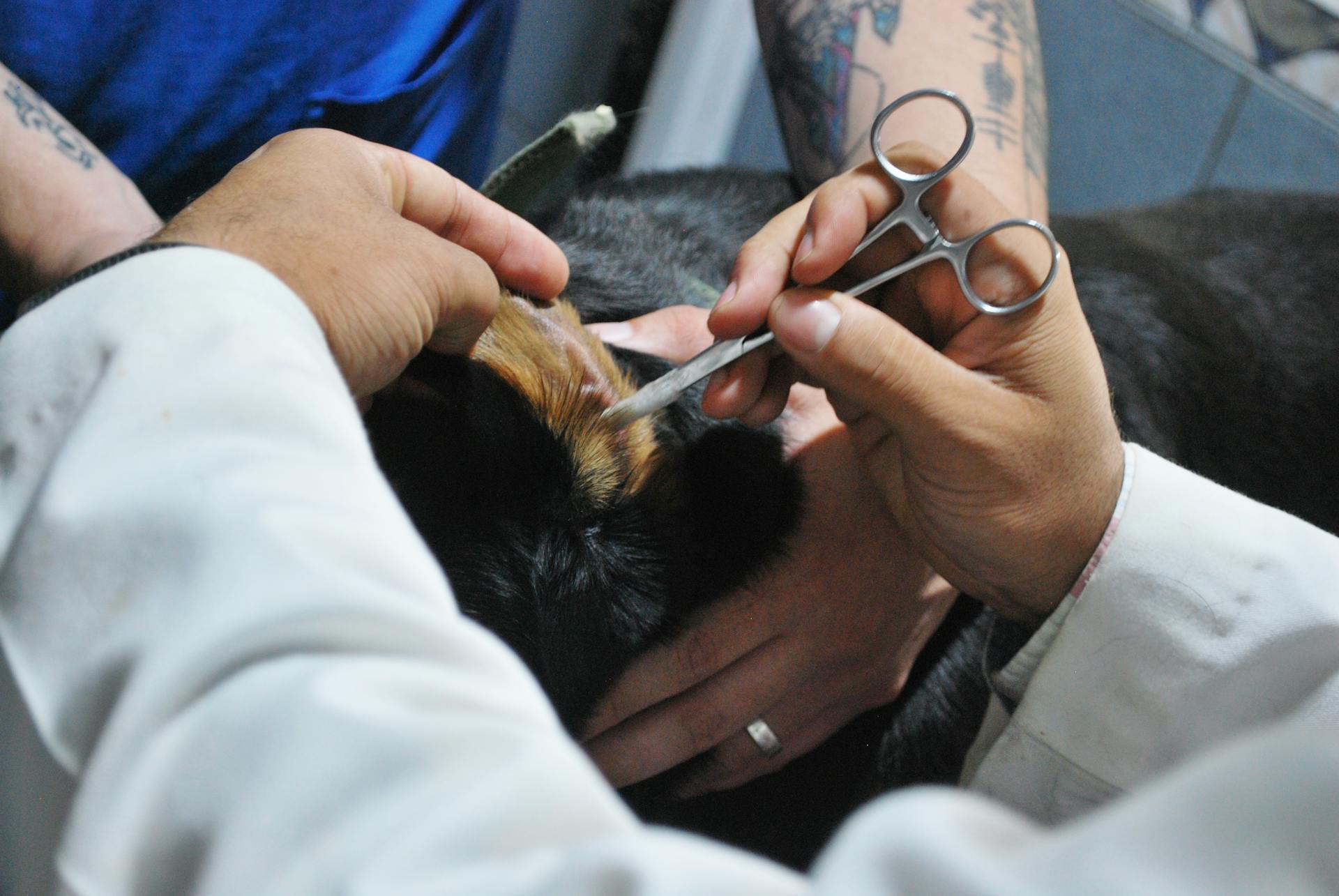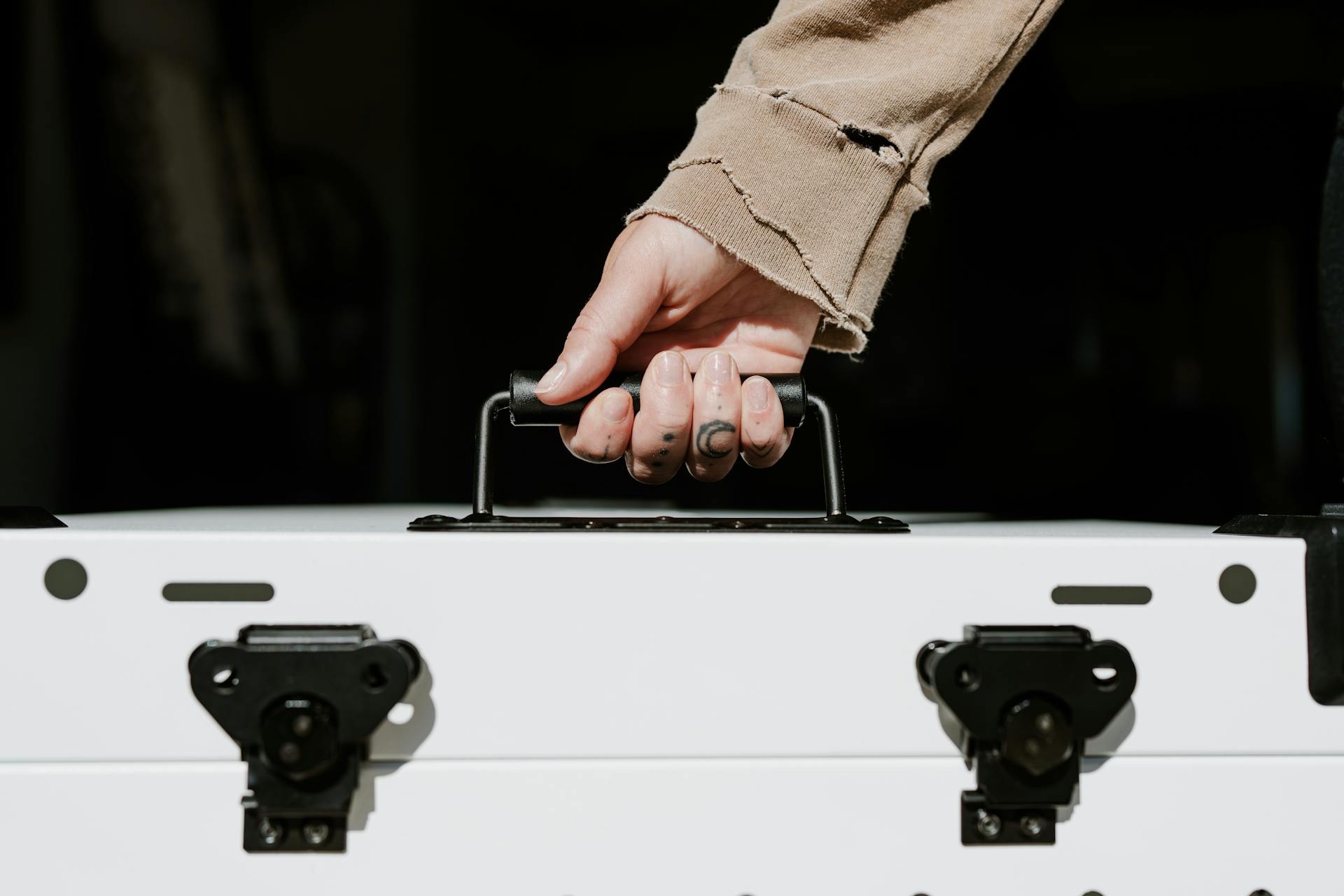
Dogs with hearing loss can benefit from specialized hearing aids designed specifically for them.
These hearing aids can help improve their ability to communicate with their owners and navigate their surroundings.
Some hearing aids for dogs use a combination of microphones and amplifiers to enhance sound quality and clarity.
A common type of dog hearing aid is the bone conduction hearing aid, which transmits sound vibrations through the dog's skull.
This type of hearing aid is often used for dogs with conductive hearing loss, where sound waves are unable to reach the inner ear.
Research has shown that dogs with hearing aids can improve their communication skills and even learn new commands.
Explore further: Assistance Dog Training
Understanding Dog Hearing Loss
Hearing loss in dogs can result from a variety of factors, including age, genetics, and exposure to loud noises. Just like humans, dogs can experience gradual hearing deterioration, sometimes making it difficult for them to respond to commands or even notice when a family member enters the room.
Some breeds are more predisposed to hearing problems than others. For example, Dalmatians are known to have a higher incidence of deafness due to genetic predisposition.
Dogs can experience temporary or permanent hearing loss due to noise trauma, caused by loud environments or exposure to intense sounds such as fireworks, gunshots, and loud music.
As dogs grow older, associative hearing loss may occur, impacting their ability to detect sounds. This is a common issue that affects many dogs as they age.
If your dog is struggling to hear, you may notice that they jump more easily when surprised, indicating an increased startle response. This could be a sign that they're struggling to hear approaching sounds.
Here are some common indicators of hearing loss in dogs:
- Increased Startle Response: If your dog jumps more easily when surprised, they may be struggling to hear approaching sounds.
- Lack of Reaction to Commands: Dogs who once responded promptly to commands may ignore them, suggesting hearing difficulties.
- Changes in Barking: A noticeable change in pitch or volume could be an indication of hearing loss.
- Difficulty Locating Sounds: Dogs often use their sharp hearing to locate sounds; if your dog seems disoriented or confused about where sounds are coming from, a hearing assessment may be needed.
Diagnosing and Treating Hearing Impairment
To determine if your dog is hearing-impaired, your veterinarian can perform the BAER (brainstem auditory evoked response) test, which tests for electrical activity in your dog's auditory pathways.
The BAER test can also determine whether your dog is suffering from hearing loss in one or both ears.
If you notice your dog suddenly ignoring your commands or becoming disobedient, it may be a sign that they are hearing-impaired.
Other signs to look out for include excessive barking, your dog getting startled more easily, and showing no response to everyday sounds like knocking or the doorbell.
If you notice any of these issues, it's essential to schedule an appointment with your veterinarian to discuss your options.
Here are some common signs of hearing loss in dogs:
- Increased Startle Response: If your dog jumps more easily when surprised, they may be struggling to hear approaching sounds.
- Lack of Reaction to Commands: Dogs who once responded promptly to commands may ignore them, suggesting hearing difficulties.
- Changes in Barking: A noticeable change in pitch or volume could be an indication of hearing loss.
- Difficulty Locating Sounds: Dogs often use their sharp hearing to locate sounds; if your dog seems disoriented or confused about where sounds are coming from, a hearing assessment may be needed.
A veterinarian can perform thorough diagnostics to assess the extent of your dog's hearing loss and recommend suitable devices based on their specific needs.
Treatment Options
If your dog has congenital deafness, unfortunately, it's irreversible. Medical or surgical approaches may be used to treat hearing loss caused by inflammation of the ear, but the effectiveness depends on several factors including the extent of the disease and X-ray findings.
Hearing aids can sometimes be used for dogs, but their effectiveness depends on the type and severity of the hearing loss. Conduction problems, in which sound waves don't reach the nerves of hearing, may improve as inflammation of the outer or middle ear is resolved.
If your dog has hearing loss due to inflammation of the outer or middle ear, their hearing may improve once the inflammation is resolved. This can make a big difference in their quality of life and ability to respond to commands.
Here are some factors that determine the effectiveness of medical or surgical approaches to treating hearing loss in dogs:
- Extent of disease
- Bacterial cultures
- Sensitivity test results
- X-ray findings
Evaluating Treatment Effectiveness
Smaller breed dogs tend to tolerate ear pieces associated with hearing aids better than large breed dogs.
In dogs with some residual ear function, hearing aids are effective if the dog will tolerate ear pieces in their ear.
If a dog has no residual hearing function, such as complete hearing loss with age, congenital hearing loss, or ototoxicity, hearing aids are not effective.
Suggestion: Why Does My Male Dog Lick My Female Dogs Ear
Post-Treatment Considerations
After your dog has received a hearing aid, it's essential to provide a gradual adjustment period to prevent overwhelming them. This can take anywhere from a few days to a week.

During this time, keep the volume low and gradually increase it to a comfortable level to prevent discomfort or pain. You can start by playing calming music or white noise at a low volume to help your dog get used to the new sounds.
It's also crucial to monitor your dog's behavior and adjust the hearing aid settings accordingly. If you notice any signs of stress or discomfort, consult with your veterinarian or a hearing specialist for guidance.
Helpful, smart, kind, efficient
As a caring companion, I've learned that being helpful, smart, kind, and efficient is crucial in our relationships with pets.
Hearing aids can be a practical solution for deaf dogs who have lost their hearing due to non-genetic reasons.
Being smart means understanding that hearing aids don't work for hearing impaired dogs with genetic issues, as they're not effective in cases of congenital deafness.
Kindness comes into play when considering the unique needs of each pet, and being aware that some dogs may not be helped by hearing aids.
Efficiency is about finding solutions that work, and for some deaf dogs, hearing aids can provide a significant improvement in their quality of life.
Take a look at this: Hearing Aids
Adjustment Time

A period of adapting to hearing aids should be expected after fitting a dog with the device.
Adjustment periods can vary, with some dogs adapting quickly while others may take time to become comfortable with the new sounds.
Patience and gradual acclimatization are key to helping dogs adjust to their new hearing aids.
No recovery is required after fitting a dog with hearing aids, but a period of adapting to the device should be expected.
Financial Aspects
The cost of hearing aids in dogs can be a significant financial burden for pet owners.
Hearing aids in dogs could cost between $150 to $700, depending on the style and brand of human hearing aids used and associated auditory testing.
Cost of
The cost of taking care of your furry friend can add up quickly. The cost of hearing aids in dogs can range from $150 to $700, depending on the style and brand of human hearing aids used and associated auditory testing.

Some treatments may require multiple sessions, which can increase overall costs. A single surgery to correct a common issue in dogs can cost anywhere from $500 to $2,000.
The cost of dog food can vary significantly depending on the type and quality of food chosen. For example, a high-end dog food can cost upwards of $100 per month.
It's worth noting that some costs, like veterinary care, can be unpredictable and may require emergency funding.
Investing in
Investing in hearing aids for your pet can be a significant expense, especially if they don't respond well to the foreign object near their ears.
Some dogs, particularly smaller breeds, do relatively well with hearing aid devices, according to veterinarians.
Not all dogs are tolerant of hearing aids, with larger breeds being less likely to adapt to them.
It's essential to consider your pet's individual needs and temperament before making a decision on hearing aids.
Broaden your view: Dog Breeds Watch Dogs
Frequently Asked Questions
How much do dogs' hearing aids cost?
Dogs' hearing aids typically cost between $3,000 to $5,000. This significant investment may be worth considering for dogs with severe hearing loss.
Can a dog's hearing be restored?
Unfortunately, a dog's hearing can be permanently damaged due to bacterial infections, noise, or trauma, and recovery is unlikely in such cases. However, in some instances, antibiotic treatment may help restore hearing if the deafness is caused by a bacterial infection
Do they make cochlear implants for dogs?
Cochlear implants are not a practical solution for dogs due to their current design. However, there are alternative options available for dogs with residual hearing.
Can a deaf dog hear a dog whistle?
Some deaf dogs may be able to hear high-pitched sounds like a dog whistle, but it's not a guarantee. If your dog can hear a whistle, it can be a useful tool for communication
Do dogs know they are going deaf?
Dogs can't express their deafness verbally, but they often show signs of hearing loss through changes in behavior. If you notice your dog's reactions to sounds changing, it may be a sign that they're experiencing hearing loss.
Sources
- https://wagwalking.com/treatment/hearing-aids
- https://www.dogster.com/dog-health-care/are-there-dog-hearing-aids
- https://cahs.uc.edu/about/departments-schools/communication-sciences-and-disorders/speech-and-hearing-clinic/fetchlab.html
- https://www.walkinpets.com/hearing-aids-for-dogs/
- https://halvingrs.sites.umassd.edu/unlocking-a-new-world-understanding-dog-hearing-aids/
Featured Images: pexels.com


